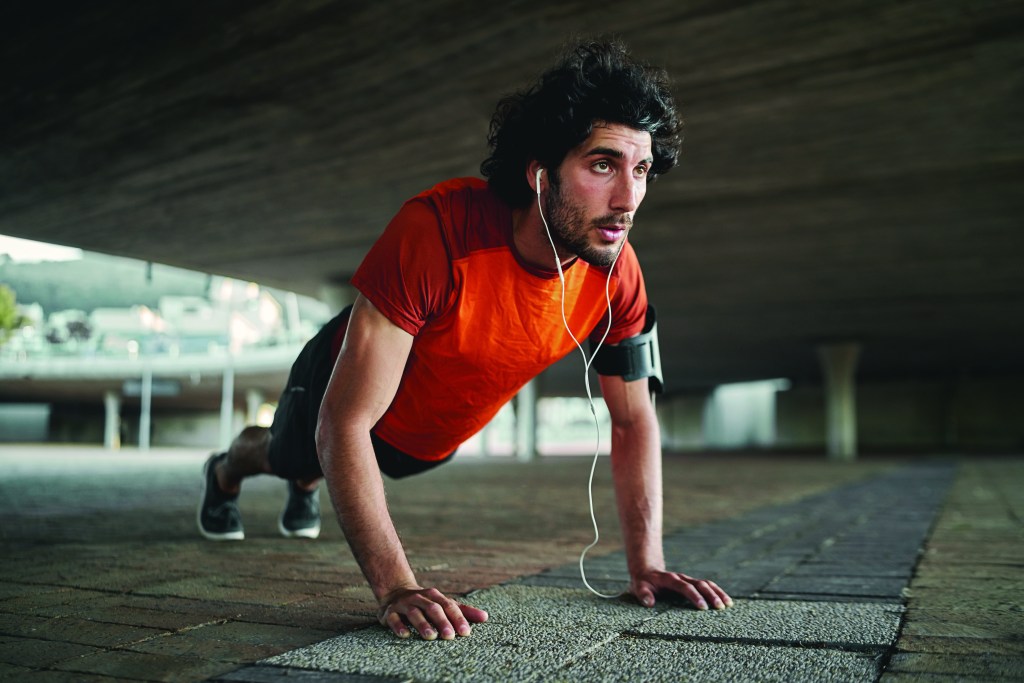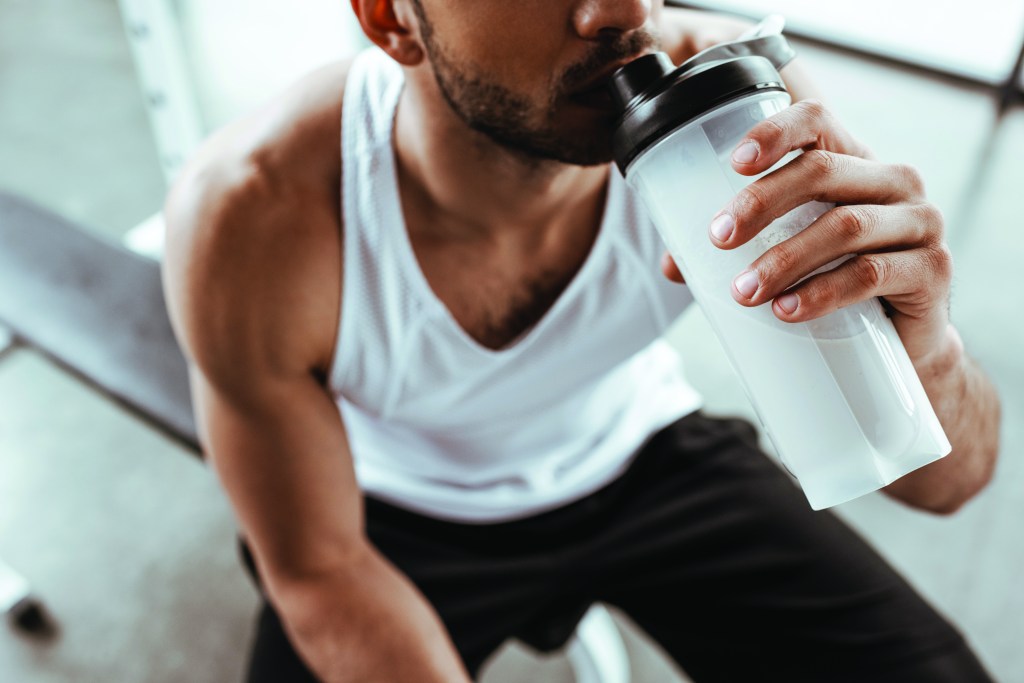From managing alcohol intake to nailing a bodyweight session, there’s no need to completely throw in the towel – a few tweaks can keep your festive fitness up this Christmas
Christmas is coming, along with office parties, mince pies and late nights fuelled by “just one more pint”. It really is the most wonderful time of year – unless of course you’re trying to cling on to any semblance of a six pack and festive fitness while surrounded by pigs in blankets and relatives pushing roast potatoes onto your plate.
December has a habit of becoming a total write off when it comes to your health and fitness regime. Until now.
We asked three experts to share their sage advice on staying fit, strong and relatively disciplined this festive season, without missing out on the fun…
Your diet
Smart not strict is the best way to approach how you eat around the festive season. But while tins of Quality Streets and whatever fancy treats M&S have conjured up this year won’t do your physique any favours, not all food is the enemy.
Protein, your muscle-maintaining macro is abundant at Christmas. Think turkey, smoked salmon, eggs, pigs in blankets, nuts and even cheese.
“Prioritise protein at every meal to help maintain your muscle mass, keep you full and balance out the extra carbs and alcohol you might be having,” says Nichola Ludlam-Raine, a Specialist Registered Dietitian and author of How Not to Eat Ultra-Processed.
Protein-based snacks can keep your intake consistent over the holidays too. Try Greek yogurt, cottage cheese, edamame or a protein shake.
Enjoy carbs in moderation. See them as extras, rather than the foundation of your plate. And, if you do go overboard on the carbs? “See it as extra energy you can use the next day for a slightly longer workout,” says Nichola.
Be mindful of your portions. If you’re at a party, stay on top of your canape count. Nichola says that six to eight canapes is equivalent to a small meal. Self-serving at the in-laws’?
“Fill a third to half your plate with vegetables, a quarter to a third with protein (such as turkey or chicken) and the rest with carbs (such as roast potatoes),” says Nichola.
Eat slowly, putting your cutlery down between each mouthful so your brain registers fullness.
Intermittent fasting can help cut back on calories, especially if you’re overconsuming in the evening and will still be fuelled come the morning. But if it’s not for you, try finding a balance over the week instead. “If you have a heavier meal one day, focus on lighter, nutrient-rich foods the next,” says Nichola.

It wouldn’t be Christmas without sweet treats, but rather than (over)eating mindlessly from the family size box of biscuits, portion out what you want in a bowl to keep calories under control.
“Choose fruit-based desserts like pavlova, baked apples or a fruity trifle. Or, have a small slice of Christmas pudding with a little custard or natural yogurt instead of high-fat brandy butter or cream,” adds Nichola.
Getting merry
Alcohol does your fitness and physique zero favours. “Alcohol can interfere with muscle protein synthesis; the process of building and repairing muscle. Even moderate drinking after intense training can reduce recovery and adaptation. Excessive alcohol can also lower testosterone levels, affecting muscle growth, strength and even mood,” says Nichola.
When you do drink, choose clear spirits with soda or slimline tonic, which are often lower in calories than creamy cocktails or beer. Sticking to beer? Pick wisely. “Lighter beers such as lager, Pilsners and 0% or low alcohol beers are lower in calories than stronger craft ales, stouts or IPAs,” says Nichola. “Check the labels of non alcoholic beers as some brands have more sugar than others.”
And don’t forget H20. “Drink a glass of water between alcoholic drinks and drink 300 to 500ml before going to bed if you’ve been drinking. An electrolyte solution before bed or the next morning can help replenish minerals lost through increased urination,” suggests Nichola.
Your training
There’s likely going to be a short period where Christmas throws you off your workout rhythm. Rather than chasing PBs, focus on maintenance instead.
“For most men, two to three full-body sessions per week is enough to preserve muscle mass. Focus on hitting all your major muscle groups with compound movements. Think squats, deadlifts, bench press, pull ups, bent over rows and lunges,” says Will Duru, a personal trainer and founder of fitness app, 12Reps.
“Even with reduced weight or volume, just keeping your muscles under tension is enough to prevent significant losses over a short holiday period. If you do want to get the most bang for your buck, add drop sets (perform a set to failure, then immediately reduce the weight and perform more reps until failure again) and supersets (two exercises back to back).”
Ideally, front load your day. Morning sessions help you tick off your workout before any last-minute pub drinks can get in the way.
“Mentally, a morning workout can set the tone for the rest of your day; you think twice before having a second slice of chocolate yule log,” says Will.

Gym closed? Or travelling away? Bodyweight and resistance-band exercises can tide you over. Think push-ups, pull-ups (or inverted rows with a resistance band), squats, lunges, glute bridges, planks and banded rows or presses.
“Really slow down the tempo, add pulses or increase reps; your muscles respond to tension, not just weight,” says Will.
If your festive diary’s rammed, you’ll need to deploy a bit of calendar coordination to make sure you’re still keeping fit without missing out on the fun. Schedule your heavy leg session before the big office party, when your energy levels are up. Post party, try something lighter and shorter; 30 minutes on the bike or a bodyweight circuit.
Will adds: “Rather than get anxious about time away from the gym, max out your recovery. Sleep, relax, use the sauna and steam, go on long walks and spend time with loved ones.”
Your immune health
Inevitably, training, nutrition and fun social plans will likely go out the window if you get struck down with a cold, cough or respiratory infection. So, supporting your immune system needs to remain at the forefront of your mind.
“Listening to your body is key: wearable tech makes this more objective than ever. HRV (heart rate variability), resting heart rate and sleep data are powerful signals of immune status. If your HRV is suppressed, recovery score low or resting heart rate elevated, it’s your body telling you to slow down,” says Dr Richie Barclay, a sports and exercise nutritionist and founder of Muto. Ignore these signals and you may face the wrath of being stuck in bed nursing a festive flu hangover.

Nutrient-wise, keep zinc and vitamin C levels topped up during the festive season.
“Zinc helps regulate immune cell activity, while vitamin C is a frontline antioxidant that reduces oxidative stress triggered by alcohol and sugar,” says Dr Barclay.
Zinc-rich foods include beef, chicken, lentils, dark chocolate and wholegrains while vitamin C is found in fruits and vegetables, especially kiwis, peppers and citrus fruits.
If your festive diet is lacking, try a supplement instead. Don’t forget your vitamin D3 supplement too, an essential during the winter months when our main source – the sun – is lacking. “Pairing vitamin D3 with K2 improves calcium regulation and cardiovascular health, which supports long-term resilience,” says Dr Barclay.
You might also consider an NAD+ (Nicotinamide Riboside) supplement. “For men over 30, NAD+ levels naturally decline,” says Dr Barclay. “This coenzyme fuels mitochondrial energy, DNA repair and immune defence. Supporting it helps maintain steady energy, sharper focus and faster recovery.”
As well as this, Dr Barclay suggests slowing down and activating your parasympathetic nervous system -your body’s natural ‘rest and digest’ mode- to give your immune system extra support.
“This contrasts with your sympathetic nervous system, which controls your ‘fight or flight’ response.
“Stress, cold weather, alcohol and lack of sleep push your body into a constant ‘sympathetic overdrive’. When this happens, the mitochondria, aka, the powerhouses of your cells, can’t function optimally.”
Breathwork, meditation or simply slow nasal breathing can shift your body back into that parasympathetic restorative state.
Had a boozy night? Avoid intense exercise the next day. We’re talking any form of Hyrox training, tempo runs and CrossFit.
According to Dr Barclay, the risk of cardiac events spikes when you’re run down. Instead, move gently; go for a walk or try yoga to help your body recover.
And if you do get ill? “Rest completely if you have a fever, chills, body aches, chest congestion, deep cough or you’re wheezing. If you have mild symptoms above the neck, such as a runny nose, and you have enough energy, then light activity might help,” says Dr Barclay.
Try walking, stretching, zone two cardio exercise or mobility work.






